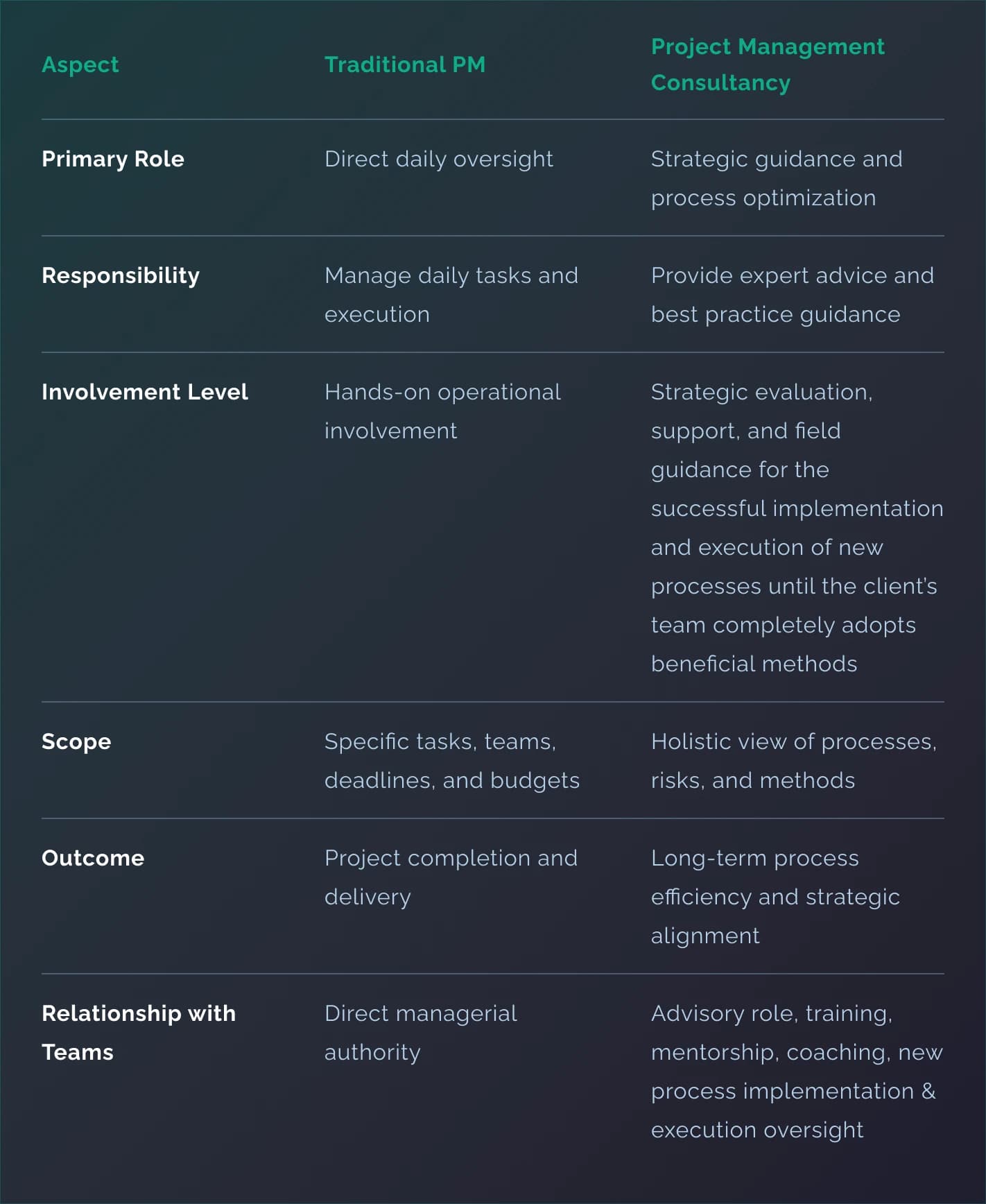What is Project Management Consultancy and Why Do You Need This

So, you’ve been luckier than many startups: you had a brilliant idea and secured the funding to keep going! Now, as you work on bringing your product vision to life, considering project management consulting services can be a crucial decision for your success. Why? Managing startup product development effectively is challenging.
This article explains how project management consultants help ensure smooth and cost-efficient product development by rewriting processes, eliminating risks, and correcting IT project outcomes to fit your most important business goals. We also offer handy tips on finding a trustworthy partner for this critical role.
Understanding Project Management Consultancy

What Is a Project Management Consultancy?
Sometimes, your project looks just perfect — clear goals, budget, and timelines — but reality steps in, and things unravel. Products fall behind, resources get wasted, and the team feels drained. If this sounds familiar, external PM experts can help.
Instead of managing daily tasks, consultants observe your existing processes. They offer practical advice without forcing their methods onto your team. Their goal is to strengthen your current processes without disturbing your startup’s unique culture and without outsourcing business functions to external providers.
They can either guide your team toward the benefits of project management consultancy — like smarter planning, reliable execution, and IT project results aligned with your business goals — or step in directly to manage your team temporarily. That includes auditing current processes, suggesting improvements, setting up tools, and helping your team develop the necessary skills.
Key Roles and Responsibilities of a Project Management Consultant
In the context of the role of a project management consultant company, their team typically offers the following services and competencies:
- Audit of practices: Consultants review your team’s daily tasks, communication style, and technical documentation. They spot inefficiencies through direct team member interviews and ongoing process evaluations to reveal the exact barriers and roadblocks slowing your progress.
- Methodologies and tools setup: They help you choose appropriate frameworks like Agile, Scrum, or Kanban. The key functions of project management consultancy specialists include helping you implement best IT practices and management tools like Jira or Trello.
- Roadmap creation: PM consultants draft clear plans, step-by-step scenarios, milestones, and timelines. For instance, they might outline a precise six-month schedule detailing critical points to maintain control.
- Risk assessments: Specialists identify possible risks — technical, financial, and operational — and prepare detailed contingency plans. They ensure your venture withstands unexpected issues.
- Team training: PM professionals can deliver focused workshops and personalized mentorship sessions. Topics include communication, risk management, and agile practices, enhancing your team's capabilities.
- Team evaluation: Consultants review team roles, responsibilities, and skills. They recommend precise changes to improve teamwork and productivity.
- Cost-benefit analysis: Project management consulting specialists examine the financial and strategic impact of tasks and features. They prioritize actions to make the most of your resources, aligning spending directly with your strategic goals.
Project Management vs. Project Management Consultancy: What’s the Difference?
What is a project consultant in comparison to the typical tasks of a project manager? Knowing this distinction helps you choose the right approach for your startup, optimizing your resources and effectiveness, including software development process optimization.

Why Do Businesses And Startups Need a Project Management Consultancy?

Managing IT development projects can be highly challenging for businesses and startups, especially when expanding quickly or entering new markets. Even with clear goals, limited resources or skill gaps often lead to missed deadlines, overspending, or lower product quality in domains like web-based solution development and other technological ventures. Understanding the importance of project management consultancy helps avoid these pitfalls.
Here’s how project management consultancy works and the specific benefits of project management consultancy:
Ensure Project Success, Even with Limited Resources
Consultants help businesses deliver successful projects, even with limited resources — without inflating budgets through additional hires, contractors, or unnecessary service subscriptions. Resources are often spread thin due to outdated technologies, inefficient software tools, or mismatched team roles.
As confirmed by our experience with one of our customers, implementing a dedicated PPM (project portfolio management) tool and efficient backlog management can boost user satisfaction and adoption rates by up to 20%, demonstrating improved alignment with user and stakeholder needs. Consultants correct these inefficiencies, ensuring maximum productivity without overspending!
Risk Management Expertise Your Team Lacks
Project management specialists bring unique expertise your internal team may lack, such as cybersecurity threat analysis, identifying hidden financial risks, or detecting supply chain vulnerabilities. Their detailed assessments provide robust strategies that safeguard your projects from unexpected disruptions.
Boost Team Productivity and Collaboration
The role of a project management consultant is to clarify each team member’s responsibilities, set precise expectations, and improve communication across your staff. Targeted workshops and direct mentorship enhance teamwork, helping teams become more productive, motivated, and efficient.
Stronger Quality and Fewer Errors to Keep Projects on Track
Consultants introduce clear quality control processes, such as automated testing, systematic code reviews, and strict validation checkpoints. For instance, consultant-led introduction of new tools, as demonstrated in our case study, resulted in a 30% decrease in support tickets and a 15% improvement in reporting visibility to management.
Smart Resource and Cost Management
Effective cost management starts with identifying what's going wrong. Experienced PM professionals conduct detailed cost-benefit analysis of every expense item, clearly outlining their financial advantages and disadvantages. By doing this, consultants help teams prioritize investments more meaningfully, so their precious resources go where they'll make the strongest impact. As confirmed by our client experiences, such targeted financial analysis has resulted in up to a 25% reduction in resource conflicts for both higher financial clarity and better strategic decision-making.
Core Services Offered By A Project Management Consultant

When to hire a project management consultant? PM consulting specialists step in when internal team managers require additional skills, competences, or external expertise. They provide an unbiased, fresh perspective, especially useful when projects or project portfolios face stagnation for reasons difficult to identify without third-party involvement. Consultants can assist in effectively allocating limited resources, collaborating with colleagues without conflicts, or adopting the best technologies available in the market without making blind investments.
What is a project consultant in the high-tech sector? They are IT experts with strong organizational, technical, and analytical skill sets. They will teach you how to structure workflows, coach you on how to set project priorities, and introduce you to up-to-date decision-making frameworks. Their management and interpersonal skills enable them to mentor teams, resolve conflicts, and optimize collaboration.
Here’s how project management consultants add value:
Planning and Strategy Development
Feeling disorganized and uncertain about where to take your next project steps? PM consultants break projects into structured steps with clear milestones, making objectives achievable and aligned with business goals. They assign responsibilities and use tools like Microsoft Project, Jira, or Smartsheet to keep workflows organized. One of the key benefits of project management consultancy is its ability to align each phase with the final objective, reducing inefficiencies and improving execution.
Budget Control and Cost Optimization
Project management consultancy professionals analyze cost structures using Earned Value Management (EVM) and forecast financial needs with QuickBooks or SAP. They flag unnecessary spending, adjust financial plans, and enforce cost controls. The role of a project management consultant in budgeting is to prevent waste and maximize financial efficiency.
Risk Identification and Mitigation
Every project faces risks — technical failures, supplier issues, or compliance problems. PM specialists apply risk modeling methods such as Monte Carlo simulations or FMEA (Failure Modes and Effects Analysis). They create contingency reserves and use platforms like RiskWatch to track emerging threats. Businesses rely on these strategies to stay resilient against unexpected disruptions.
Quality Assurance and Performance Tracking
Why do projects spiral out of control despite careful planning? Errors, poor execution, and workflow gaps inflate costs and cause delays. Project management consultancy experts introduce automated testing with Selenium, Cypress, or JMeter.
Stakeholder Coordination and Communication
Conflicts and misalignment slow projects down. PM consultants centralize reporting through Power BI, Trello, or Confluence dashboards. They organize sprint reviews, schedule regular status updates, and streamline information flow between executives, clients, and teams.
Process Refinement and Workflow Optimization
Bottlenecks and redundant tasks reduce productivity. Project management consultants assess workflows and introduce automation tools. If you're unsure about how to find project management consultants, reviewing case studies and industry-specific recommendations can help identify professionals who specialize in your business domain.
Resource Planning and Team Structuring
Uneven workload distribution leads to inefficiency. Project management consultancy professionals use workforce management tools like Float, Workday, or SAP SuccessFactors to assess team capacity, reallocate resources, and identify hiring needs. By balancing workload distribution, they help businesses prevent burnout and maintain consistent productivity.
Compliance and Regulatory Management
Regulatory missteps lead to penalties and legal risks. PM specialists ensure adherence to HIPAA, GDPR, or ISO 27001 by conducting compliance audits, setting governance frameworks, and documenting security policies. They integrate legal risk assessments into project plans, allowing businesses to operate without regulatory setbacks.
How To Choose The Right Project Management Consulting Service

Finding the right project management consulting service can make or break your project. A skilled consultant brings structure, efficiency, and problem-solving expertise. But how do you choose the right one? Here are the key factors to consider:
Industry Experience and Expertise
Not all project management consultants fit every industry. A consultant with deep experience in your field understands its challenges, regulations, and best practices. Whether it's IT, construction, or healthcare, industry-specific knowledge helps avoid costly mistakes and keeps the project aligned with sector standards.
Certifications and Accreditation
Their qualifications say a lot about their skill level. Look for professionals with globally recognized certifications like PMP (Project Management Professional), PRINCE2, or Agile certifications such as CSM (Certified Scrum Master). These credentials prove expertise in handling complex projects with structured methodologies.
Client Portfolio and Case Studies
A consultant’s track record speaks louder than words. Review their past work, case studies, and client testimonials in Clutch. Have they successfully managed projects similar to yours? Strong results from previous clients indicate their ability to deliver value and solve real-world challenges.
Use of Modern Project Management Tools
A reliable consultant should leverage cutting-edge project management tools. Software like Jira, Trello, Microsoft Project, or Asana helps streamline tasks, track progress, and manage team collaboration effectively. Ask about the tools they use and how they integrate them into their process.
Questions to Ask before Hiring a Consultant
Before making a decision, ask critical questions to assess fit. Some key questions include:
- How do you handle scope changes and unexpected project challenges?
- What project management methodology do you follow — Agile, Waterfall, or Hybrid?
- Can you provide examples of projects where you improved efficiency or reduced costs?
- What reporting and communication practices do you use?
- How do you tailor your approach to fit different company cultures?
Summary
While you can forge ahead without help, the complexity of product development makes project management consultancy a strategic asset. Tight deadlines, limited resources, and technical challenges demand expert guidance. At Implex, our experienced consultants streamline processes, optimize resource allocation, and mitigate risks to ensure your product launch is smooth and efficient.
Ready to overcome obstacles and launch successfully? Contact us today and let us help secure your startup’s future.



